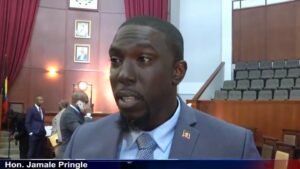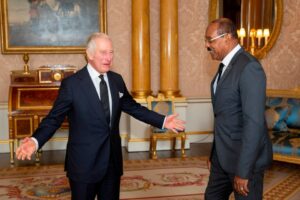An unexpected political event unfolded in Antigua when Opposition Leader Jamal Pringle openly admitted to treason during a live broadcast. His comments came amid allegations of missing funds and foreign influence linked to political machinations, prompting strong reactions from both the government and the public.
Jamal Pringle's Remarkable Admission Sparks Political Turmoil in Antigua

Jamal Pringle's Remarkable Admission Sparks Political Turmoil in Antigua
Opposition Leader Jamal Pringle’s shocking confession of collusion raises questions amid a larger controversy involving alleged financial misconduct and treason.
ST. JOHN’S, ANTIGUA — In an unprecedented political spectacle, Opposition Leader Jamal Pringle has allegedly stumbled into confession territory on live television, igniting a firestorm of controversy and raising serious questions about potential treason.
In a disconcerting episode, viewers were treated to an array of accusations spiraling around treason, corruption, and a staggering sum of $74 million that has seemingly vanished. Current tensions were further escalated by claims of foreign interference and illegal actions supposedly orchestrated by Dani Peretz, once a trusted associate of investor Alki David, who now stands accused of embezzling the substantial amount.
As the narrative unfolds, the allegations against Peretz paint a vivid picture of political intrigue echoing Hollywood dramas gone haywire. Reports suggest that he has diverted the missing funds towards a web of legal and intelligence operations designed to undermine the Antiguan government, raising eyebrows and repercussions throughout the region.
In a bewildering moment, Pringle took center stage, virtually handing prosecutors a case against him and his party with statements that appear to admit culpability in collaboration with outside interests. During his live remarks, Pringle stated, “Yes, we engaged with those claims. Yes, our involvement contributed to this lawsuit.” His words have left many questioning whether the entire leadership of the United Progressive Party (UPP) is complicit in this unfolding disaster.
While Pringle seemed unfazed by the gravity of his disclosure, with several key UPP members absent from the dialogue, the implication that they might be either willfully involved or shockingly oblivious to such serious allegations poses significant concerns about their fitness to govern.
The alleged diversion of the $74 million has further fueled speculation regarding its potential uses. Sources suggest a portion financed legal assaults against the government, while other funds reportedly catered to dubious claims against officials or financed operations of questionable legitimacy from firms notorious for their controversial tactics.
Amid the unfolding drama, the involvement of high-profile legal figures like David Boies, whose connections align with infamous entities like Jeffrey Epstein, raises further concerns about the ethical landscape underlying this political crisis. The insinuation that influential lawyers may be entangled in the destabilization of a nation could shake the institutional fabric of Antigua.
Now, the country’s political landscape hangs in the balance as Prime Minister Gaston Browne prepares to retaliate with legal measures, including potential defamation lawsuits against Pringle and the UPP. Meanwhile, the public is left grappling with the unsettling reality that their representatives may have compromised the very sovereignty they vowed to protect in favor of foreign agendas.
The ripples of this shocking ordeal will likely resonate far beyond Antigua, positioning it as a case study in political vulnerability and the dangers of unchecked ambition within governance.



















